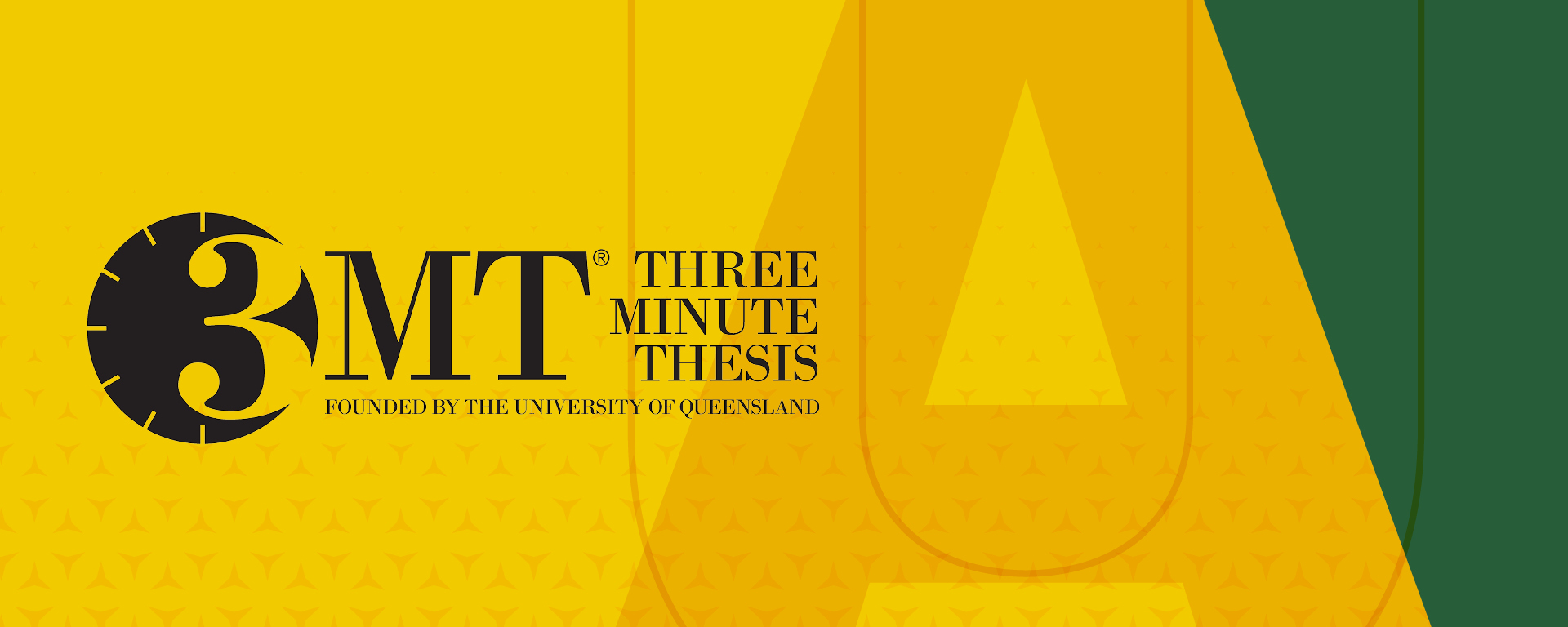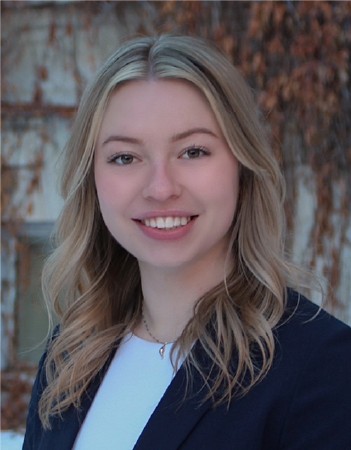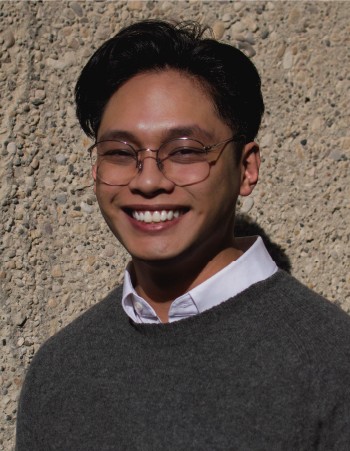Three-minute Thesis

The Three Minute Thesis (3MT™) is an academic competition like no other. Participants have just three minutes to explain the breadth and significance of their research projects to a non-specialist audience.
To learn more, view the items below, and check out the "Program and Schedule" link for information about workshops and other elements of the competition.
Meet Our Winners!
Congratulations to all of our 2024 finalists, who did a spectacular job at the U of A finals event on March 27. We’re pleased to announce the winners:
Be sure to cheer for Alexandra at the Western Canadian Regional Competition at UBC Okanagan in Kelowna on May 8.
Want to view the 2024 U of A finals event?
Workshops
In late January and early February, we offered an information session and two workshops to help you craft a competitive Three Minute Thesis (3MT) entry.
What is a Three Minute Thesis? | Online info session | Not for PD credit
Date: Wednesday, January 24
Time: 12 - 1 p.m. MST
U of A geared up for another 3MT competition to get you involved! You would have learned how you could challenge yourself and get creative while refining your skills in communication and knowledge translation.
How to hook the audience in 30 seconds | Online workshop | 1.5 hr PD credit
Date: Tuesday, January 30
Time: 12:30 - 2 p.m. MST
This workshop reviewed the importance of capturing your audience's attention in the first 30 seconds. We considered how to do this creatively, and how to set the stage for a more engaging presentation.
The structure and delivery of a good 3MT | Online workshop | 1.5 hr PD credit
Date: Tuesday, February 6
Time: 12:30 - 2 p.m. MST
After having a solid first 30 seconds, what about the next 150? This workshop offered you tools to structure your 3MT effectively, time it perfectly, and make it engaging from beginning to end.
Registration Period
- Registration is now closed.
- Registration ran until Friday, February 23 at 12 p.m. MST
Events
People joined us to support graduate student research...three minutes at a time!
U of A 3MT Preliminary Round (in-person)
Date: Monday to Friday (every day), February 26 to March 1
Time(s): 2 - 3:30 p.m. MST
Location: South Academic Building, U of A Campus (rooms vary by day)
U of A 3MT Finals (in-person)
Date: Wednesday, March 27
Time: 4:30 - 6 p.m. MDT
Location: 2-190 ECHA, North Campus
If you’re actively enrolled in a master's or PhD graduate program at the U of A and are in good standing with their graduate program and the Faculty of Graduate & Postdoctoral Studies, you can compete at 3MT™.
Eligibility Details
- You are still eligible to compete if your thesis is under submission on the date of your first competition heat.
- If your thesis is under submission and your degree is conferred while you are still competing at 3MT™, you are still eligible. However, you must have competed in your first competition heat before your degree is conferred. If you receive notification of your degree conferral before you compete in your first competition heat, you have effectively graduated and are ineligible to compete (even if you have not yet attended a graduation ceremony).
- Visiting students are not eligible to compete at 3MT™.
- You must register for the event and be eligible to present in person on the day of your first competition.
- You must be available to present in person at the finals. If the winner is not available, the runner-up will take their place provided they fulfil all requirements.
There are several benefits to competing in a 3MT™ competition. You’ll get the chance to effectively communicate your work to the public, which can help you better frame your thesis topic and refine a clear and understandable statement for scholarships.
The competition also offers you the opportunity to put your name out there while enhancing your presentation skills and developing a polished pitch for potential job interviews. And, you’ll be able to connect with fellow researchers and contribute to a broader research community, all while adding a valuable line to your resume or CV.
Of course, there’s also prize money for the winners.
- A single static PowerPoint slide is permitted (no slide transitions, animations or “movement” of any description, the slide is to be presented from the beginning of the oration). Please note that using a slide is optional as the presentation focus is on your speaking skills. Images used in the slide must be your own, or you must have permission from the owner of the photo(s) and provide proper credit(s).
- No additional electronic media (e.g. sound and video files) are permitted.
- No additional props (e.g. costumes, musical instruments, laboratory equipment) are permitted.
- Presentations are limited to a maximum of three minutes.
- Presentations that go over three minutes will lose marks in the heats and will be disqualified in the final.
- Presentations are to be spoken word (e.g. no poems, raps or songs).
- Presentations must be based on research directly related to the student's graduate program thesis. Research performed for employment should not be presented.
- Presentations are to begin from the stage.
- Presentations are considered to have started when a presenter starts their presentation through movement or speech.
- Presenters must consent to be filmed for the finals only.
- The decision of the judging panel is final.
Presentations in the semi-finals and finals will be judged by a panel of judges from the U of A and the Edmonton community. The judges make their decisions based on three main categories: communication, comprehension and engagement.
Communication
- Was the thesis topic and its significance communicated in a way that a general/non-specialist audience could understand? Did the speaker use sufficient eye contact and vocal range, maintain a steady pace and have a confident stance?
- Did the speaker avoid jargon, explain terminology and provide enough background information to support their key points?
- Did the speaker spend the right amount of time on each element of their presentation?
- Was the PowerPoint slide clear, legible and concise and did it enhance the speaker’s presentation?
Comprehension
- Did the presentation help the audience understand the research and research methods?
- Did the presenter clearly outline the nature and aims of the research?
- Did the presenter clearly define the significance and impact of their research?
- Did the presentation follow a logical sequence?
Engagement
- Did the presentation make the audience want to know more?
- Was the presenter careful not to trivialize or overly generalize the research?
- Did the presenter convey enthusiasm for their research?
- Did the presenter capture and maintain their audience's attention?
This fun, highly informative and very entertaining event was developed by the University of Queensland in 2008 and is now held in more than 85 countries around the world. Our winners will move on to the Western finals and possibly the Canadian national event.
Contact Us
Send questions about the 3MT™ competition to:
Dr. Rob Desjardins
Professional Development Instructional Designer
Faculty of Graduate & Postdoctoral Studies
Email: robertd1@ualberta.ca
Want to support graduate students at the U of A? Your donation to the Graduate Studies and Research Fund can help! Give now.

